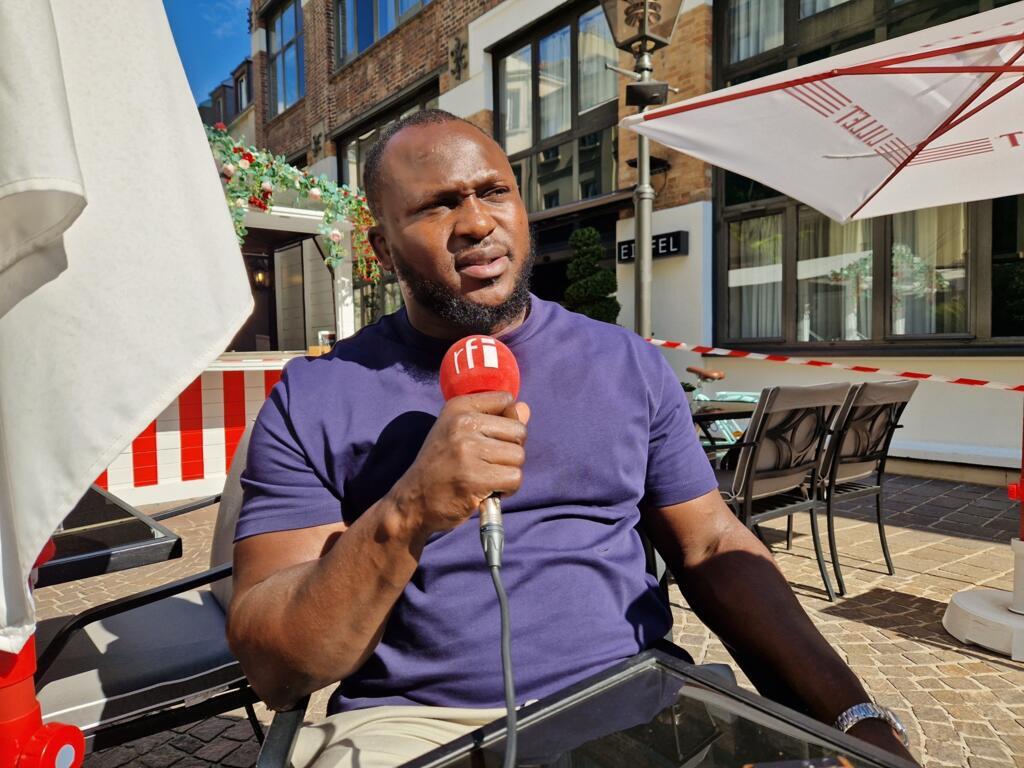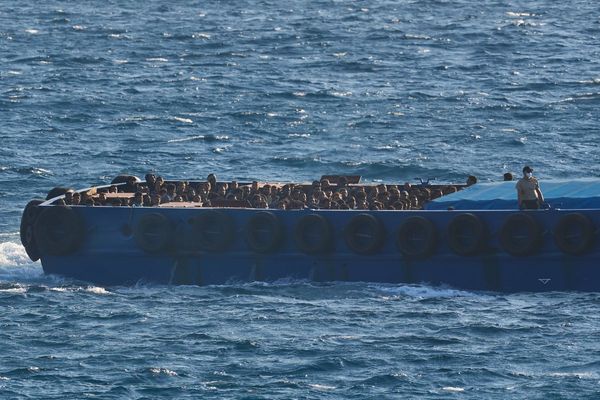
For nearly six years, wrestler Modou Lô has reigned as the undisputed “king of the arena” in Senegal – a title that carries more weight than any footballing accolade in the country. Ahead of his blockbuster bout with Sa Thiès in April next year, he talks to RFI about mysticism, MMA, politics and who he believes will inherit his crown.
RFI: Modou Lô, you’ve been Senegal’s “king of the arena” since July 2019. How important is this title in Senegal?
Modou Lô: You need to understand that wrestling is Senegal’s most popular sport – ahead of football, even if there’s no big event like the AFCON or the World Cup. When you’re king of the arena, you’re champion of all wrestlers.
Our discipline is wrestling with strikes – a very tough sport for diambars (warriors) that demands strength, discipline and courage. Being the best in the field is a huge source of pride. But being a champion doesn’t mean you can do whatever you like, just because you’ve beaten everyone. You have to embody the status – in the way you speak, behave and carry yourself. It comes with great responsibility.
RFI: So it comes with a lot of pressure…
Less than you might think. You don’t become king overnight. The journey to get there is a form of training in itself – it builds you mentally so that by the time you reach the top you’re ready to handle it naturally.
RFI: When did you first start dreaming of the crown?
I dreamed of the title from the moment I began wrestling. From my very first fights in the mbapatt [small traditional tournaments held in working-class neighbourhoods], I had that ambition. Mbapatt is like a school – it’s where I tested myself against tough opponents and convinced myself I could make a real career in the arena.
The turning point came in a tournament sponsored by Dakar City Hall. I won the title in the second edition after losing the final in the first. After that tournament, Birahim Ndiaye – a former wrestling champion, coach and TV pundit – drove me home to talk to my parents. He told my father I had real talent and that with a bit of support, I could make a living from wrestling and improve life for the whole family. That really gave me a boost.
It wasn’t easy for my parents though. For my father, who had never had a wrestler in the family, the idea of seeing me in the arena was unimaginable. My mother was less shocked because my grandfather, whom I never met, had wrestled. So, even if it was far back, I still had wrestling blood in me. I took it as a sign of destiny.
RFI: You’ve recently become more active on social media, made more public appearances and started working with the agency Off the Pitch. Is this another way of embodying the king of the arena status?
Yes, it’s good to get closer to the fans and people who follow wrestling. I’ve had a long journey to get here – not an easy one – so sometimes it’s good to share that, to inspire young people. To show them nothing happens overnight; you need to make sacrifices, work hard.
Right now [21 August], I’m in Paris at the invitation of Next Sénégal – a diaspora platform – to talk about my career as a sportsman and entrepreneur. It’s a great initiative and I’m delighted to take part.

RFI: Does being king of the arena mean getting involved in politics?
I think when it comes to politics, everyone has the right to an opinion – to share it, to discuss it – because no one knows everything. I feel I have that right, but not necessarily by joining a party or asking people to support a particular politician. I’m not in that position yet, but I won’t hold back from giving my view on affairs concerning working-class neighbourhoods.
As someone from Parcelles Assainies [a suburb of Dakar] who wants the best for my neighbourhood, I wouldn’t rule out local involvement after retiring from sport. If politics gives me an opportunity to develop Parcelles and improve people’s lives, I wouldn't hesitate.
RFI: At 39, how much longer do you see yourself in the arena, given that the age limit has been raised from 45 to 48?
Honestly, I don’t think I’ll go that far – not even 45. I have a lot of projects lined up. I’ll do a few more fights and then leave the stage to my younger brothers. They’re very talented: Franc, Gora Sock, Petit Lô, Calva, Seydina... the list goes on. They have great potential, and with the right guidance they can achieve great things.
Women step into the ring at west African wrestling tournament
RFI: You seem very close to Franc, the new sensation who’s beaten Bombardier, Ama Baldé and Eumeu Sène in succession. How do you know one another?
We're both from Parcelles Assainies. He lives in Unit 7, I’m in Unit 10. We share the same “curse”: a love of wrestling. He’s young and building a great career. We got close because I needed sparring partners and he came highly recommended. Along with others like Gora Sock, he helped me to progress. He’s been by my side for years, always there for my fight preparations, very loyal. Now he’s making his own way. He’s an incredible talent, really strong, and making waves in the arena. We all believe he’ll go far.
RFI: Do you see him as your successor?
Of course. He’s already done something unique: 15 fights, 15 wins. That’s a huge achievement. He’s young but experienced – he’s put in the miles, travelling across the country to compete in tournaments, train and develop his skills. We’re here to support him and help him reach the very top.
RFI: You’ve fought 26 bouts since starting in February 2006. Which fight stands out the most?
My first fight against Eumeu Sène in 2014 [Modou Lô also won the rematch in July 2019 to claim the crown]. That was a major moment – a battle that lasted nearly 30 minutes, full of strikes and pure wrestling. It was brutal, and by God’s grace, I won. It was the longest and toughest fight I've ever had.
RFI: Many Senegalese athletes – especially footballers – have to go abroad to earn a decent living. Does wrestling pay in Senegal?
Absolutely! Wrestling has grown massively in recent years. Even before us, there were stars like Falaye Baldé, Double Less and Mbaye who made a living from it. Then Tyson and Yékini took it to the next level, bringing huge excitement and big money. Now, our generation – mine and Balla Gaye 2’s – is pushing it further. So yes, you can make a very good living from wrestling in Senegal, support your family and even help people you don’t know.
That said, your sporting career is short – you can wrestle until about 45, which is still young. Sport, wrestling, opens doors to other opportunities. I’m also an entrepreneur now. The money I earn from wrestling allows me to invest in other areas, create jobs and share the benefits with many others.
No pain, no gain: Chinese pro wrestlers fight for recognition
RFI: Many wrestlers have moved into MMA in recent years. Is that an option for you?
No, honestly, MMA is for my younger brothers. One of them, Petit Lô, is already involved, along with other hopefuls from Parcelles. I have no desire to fight in MMA – I just want to finish my wrestling career quietly and then retire. But it’s true MMA is a great opportunity for Senegalese wrestling. Not everyone gets fights every year, so it gives wrestlers a reason to keep training.
RFI: We can’t talk about Senegalese wrestling without mentioning mysticism. It's seen as essential to winning, beyond strength and technique. Wrestlers use ritual baths and charms to ensure victory. You were once considered one of the most mystical wrestlers, but in your last three winning fights you wore no charms, which worried your fans. Why?
For me, mysticism isn’t as important as people think. First and foremost, this is a sport. I see mysticism as part of wrestling culture – like the pre-fight dances – a bit of folklore for the fans that helps keep wrestling alive. Sporting competitions happen all over the world, but only in Senegal do we mix mysticism and sport, thinking it can influence the result.
It’s true I once believed in it, but over time I realised mysticism wasn’t what made me win. Victory comes through giving everything you've got – 100 percent effort in training.
Grease, sweat and tears for Turkey's Ottoman oil wrestlers
RFI: The big news is your next fight against Sa Thiès on 5 April, 2026. What do you think about the hype around it?
It’s true – it’ll be a huge fight. I can even say this was a demand from society; everyone wanted it. I’ve always said that as king, I’d give young wrestlers their chance – I did it with Ama Baldé, Boy Niang and Siteu, and I’m still on that path. Sa Thiès has had some great fights lately, but he’s never had the chance to fight for the crown. People talked about a bout with Tapha Tine, but the fans chose Sa Thiès. And it’s only right to give them what they want.
RFI: Sa Thiès is the younger brother of Balla Gaye 2, who beat you twice in your three career defeats. Is this a proxy revenge fight?
Not at all! Sa Thiès is Balla Gaye 2’s younger brother but this isn’t about revenge. They’re brothers, but they fight differently. It’s simply the logic of wrestling – he’s on my path, so I’ll move him aside and continue on mine.
RFI: Can fans still hope for a rematch against Balla Gaye 2?
It could have happened, but it didn’t. And I really don’t think it ever will.
This interview was adapted from the original in French.







